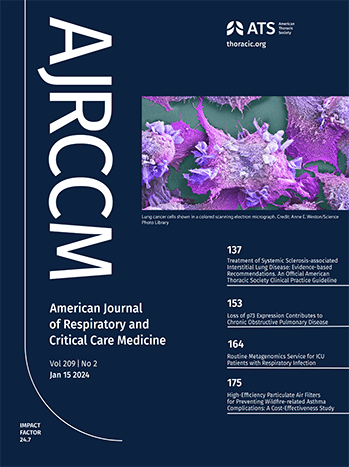Effects of Inhaled Tobacco and Cannabis Co-Use on Respiratory Health and Tobacco Cessation. An Official American Thoracic Society Research Statement.
IF 19.4
1区 医学
Q1 CRITICAL CARE MEDICINE
American journal of respiratory and critical care medicine
Pub Date : 2025-08-22
DOI:10.1164/rccm.202507-1792st
引用次数: 0
Abstract
BACKGROUND Tobacco and cannabis are among the most widely used substances globally, and rates of co-use are on the rise. Understanding the impact of inhaled tobacco-cannabis co-use on health outcomes and tobacco cessation is critical for guiding patients and clinicians. OBJECTIVES To summarize the existing evidence, identify knowledge gaps, and prioritize research questions related to effects of inhaled tobacco-cannabis co-use on tobacco cessation and lung health. METHODS A multidisciplinary committee was convened to review the evidence, identify knowledge gaps, and develop research questions in four priority research areas: 1) common data elements and terminology; 2) patterns and prevalence of co-use; 3) impact of co-use on tobacco cessation; and 4) effects of co-use on lung health. A modified Delphi process was conducted in three rounds to reach consensus on prioritizing research questions. RESULTS The evidence reviewed by the expert panel in four priority research areas yielded the following gaps in the literature with high priority to address with future research: 1) lack of consensus on terminology and recommended co-use data elements; 2) limited research on co-use and tobacco-related disparities; 3) insufficient evidence on how cannabis use affects tobacco cessation; and 4) alarming yet inconsistent findings on the effects of co-use on lung health. CONCLUSIONS This statement outlines and guides a research agenda on the effects of inhaled tobacco-cannabis co-use on tobacco cessation and lung health. Consensus-driven recommendations include adopting harmonized terms and minimum data elements; studying the prevalence of co-use among populations experiencing tobacco-related disparities; evaluating the impact of co-use on tobacco cessation pharmacotherapies; and assessing the effects of co-use on the development and progression of lung diseases.吸入烟草和大麻共同使用对呼吸系统健康和戒烟的影响。美国胸科学会官方研究报告。
背景烟草和大麻是全球使用最广泛的物质之一,共同使用率正在上升。了解吸入烟草和大麻共同使用对健康结果和戒烟的影响,对于指导患者和临床医生至关重要。目的总结现有证据,确定知识空白,并优先考虑与吸入烟草-大麻共同使用对戒烟和肺部健康的影响相关的研究问题。方法召集一个多学科委员会,审查证据,确定知识差距,并在四个优先研究领域提出研究问题:1)共同数据要素和术语;2)共用模式和流行程度;3)共同使用对戒烟的影响;4)共用对肺部健康的影响。改进的德尔菲过程进行了三轮,以达成共识,优先考虑研究问题。结果专家小组对四个优先研究领域的证据进行了审查,发现文献中存在以下空白,需要在未来的研究中加以解决:1)在术语和推荐的共同使用数据元素方面缺乏共识;2)对共同使用和烟草相关差异的研究有限;3)大麻使用如何影响戒烟的证据不足;4)关于共同使用对肺部健康的影响的令人震惊但不一致的发现。本声明概述并指导了吸入烟草和大麻共同使用对戒烟和肺部健康影响的研究议程。协商一致的建议包括采用统一的术语和最低限度的数据要素;研究存在烟草相关差异的人群中共同使用烟草的流行情况;评估共同使用对戒烟药物治疗的影响;评估共同使用对肺部疾病发生和发展的影响。
本文章由计算机程序翻译,如有差异,请以英文原文为准。
求助全文
约1分钟内获得全文
求助全文
来源期刊
CiteScore
27.30
自引率
4.50%
发文量
1313
审稿时长
3-6 weeks
期刊介绍:
The American Journal of Respiratory and Critical Care Medicine focuses on human biology and disease, as well as animal studies that contribute to the understanding of pathophysiology and treatment of diseases that affect the respiratory system and critically ill patients. Papers that are solely or predominantly based in cell and molecular biology are published in the companion journal, the American Journal of Respiratory Cell and Molecular Biology. The Journal also seeks to publish clinical trials and outstanding review articles on areas of interest in several forms. The State-of-the-Art review is a treatise usually covering a broad field that brings bench research to the bedside. Shorter reviews are published as Critical Care Perspectives or Pulmonary Perspectives. These are generally focused on a more limited area and advance a concerted opinion about care for a specific process. Concise Clinical Reviews provide an evidence-based synthesis of the literature pertaining to topics of fundamental importance to the practice of pulmonary, critical care, and sleep medicine. Images providing advances or unusual contributions to the field are published as Images in Pulmonary, Critical Care, Sleep Medicine and the Sciences.
A recent trend and future direction of the Journal has been to include debates of a topical nature on issues of importance in pulmonary and critical care medicine and to the membership of the American Thoracic Society. Other recent changes have included encompassing works from the field of critical care medicine and the extension of the editorial governing of journal policy to colleagues outside of the United States of America. The focus and direction of the Journal is to establish an international forum for state-of-the-art respiratory and critical care medicine.

 求助内容:
求助内容: 应助结果提醒方式:
应助结果提醒方式:


